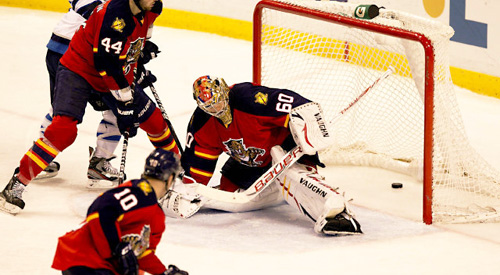
Breaking down the NHL playoff system
Thanks to the NHL’s playoff format, one of the top four teams in each conference is guaranteed to go home after the first round.
The Pittsburgh Penguins and Philadelphia Flyers have the second- and third-most points in the Eastern Conference, but are set to play each other in the first round. Similarly, the Nashville Predators and Detroit Red Wings have the third- and fourth-most points in the Western Conference, yet they too will play in the opening round.
It will surely produce some fantastic hockey to kick-off the playoffs — these teams do not particularly like each other — but two very good teams are going to go home before they should.
It isn’t fair, but it’s all because the NHL insists on seeding the divisional winners with the top three playoff positions.
In the East, the Florida Panthers have 92 points, which is tied for the sixth-highest total in the conference. Despite this piddling amount, the team holds the third seed and is currently scheduled to play New Jersey in the first round. In the Western Conference, the Los Angeles Kings have 93 points as well, a tie for the sixth-best total, and are currently set to face Chicago.
In both of these cases it isn’t even a guarantee that the Kings or Panthers will make the playoffs. Phoenix and San Jose have a shot at winning the Pacific Division, and those teams are just as close to missing the playoffs as they are winning the division. Washington could win the Southeast Division, or they could miss the playoffs entirely. Heavy competition.
[php snippet=1]
The Southeast is particularly bad this season; to the point that none of the teams in that division even have a positive goal differential. The Panthers have a minus-25; the-eighth worst in the entire league. They’re in third place in the East largely on the strength of snatching 17 points from overtime or shootout losses and competing with a bunch of teams even more flawed.
It seems hardly fitting that these teams are being rewarded for their poor play with a higher seed and home ice advantage.
They are also forcing far superior teams into tougher first round matchups — matchups that if they even survive will take a huge physical toll and hurt their chances going forward. Of course, neither Pittsburgh nor Philadelphia are afraid to play each other but I’m sure they would both rather the battle occur deeper in the playoffs.
The situation would have been rectified in the NHL’s proposed realignment plan, which called for four divisions, scrapping the conference system. The top four teams in each division would square off in the first two rounds before battling teams from the other divisions. Unfortunately, this plan had an even larger inequality—two divisions would have had only seven teams, resulting in an easier road to the playoffs for two groups of teams. That’s exactly why the NHLPA quashed the idea.
The NBA playoff format guarantees the three division winners one of the top four spots in the conference, which allows for a better team to gain a more preferential match-up, so that’s an improvement over the NHL model – slightly. However, this method still guarantees a Game 7 at home to a team that could potentially have a worse record than their opponent. That’s still wrong.
The simplest solution would be to guarantee the divisional winners a playoff spot — nothing else. If a team is backing into the playoffs thanks to playing in a bad division then they don’t deserve home ice advantage and a better match-up.
A more radical proposal would be to allow the top point getters in each Conference to pick their first-round opponent. Is there any reason New York would choose to face any team other than Florida? This would add an interesting wrinkle to the playoffs and would give selected teams some extra fuel to take onto the ice, hopefully creating an even more heated series.
As it stands, the NHL is using a flawed playoff system. Two teams with legitimate Stanley Cup chances are guaranteed to go out in the first round, all because the No. 3 seed is being held for teams that might take until the final day of the season to clinch their spot.
[php snippet=1]

